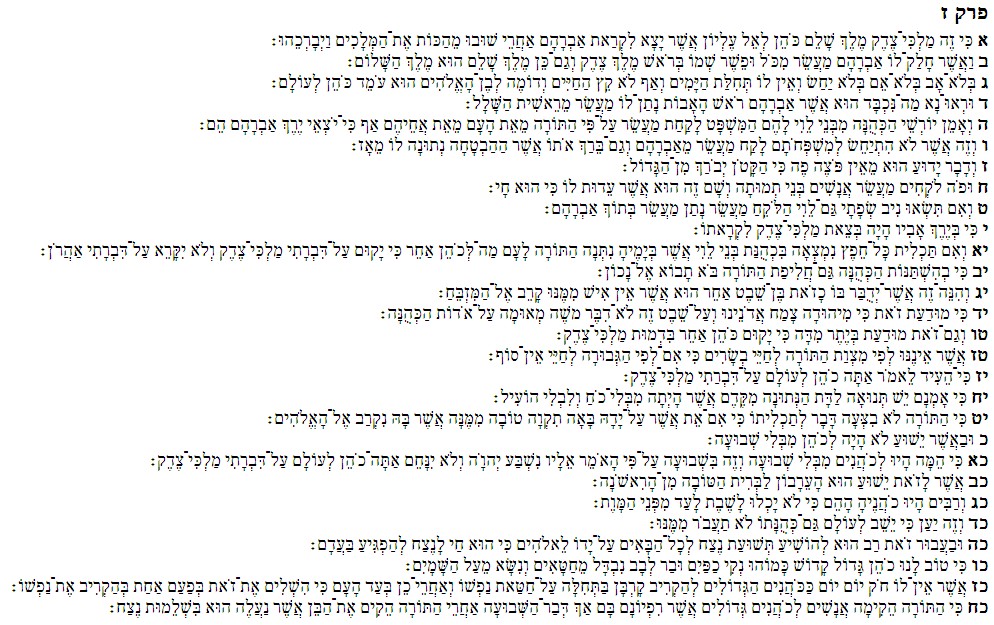

Moshiach superior than Melek Tzedek

(Beresheet 14:17-20)
7:1 For this Melekh Tzadik, king of Shalem, kohen L'El Elyon (the most high) Elohim, who met Avraham returning from the slaughter of the melekhim, and blessed him;
7:2 To whom also Avraham gave a tenth part of all; first being by interpretation Melekh Tzedek, and after that also Melekh Shalom, which is, King of peace;
7:3 Without father, without mother, without descent, having neither beginning of days, nor end of life; but made like unto the Ben Elohim; abideth a kohen continually.
7:4 Now consider how great this man [was], unto whom even the patriarch Avraham gave the tenth of the spoils.
7:5 And truly they that are of the Benai Levy, who receive the office of the Kehunah (Priesthood), have a commandment to take ma'aser (tithes) of the people according to the Torah, that is, of their brethren, though they come out of the loins of Avraham:
7:6 But he whose descent is not counted from them received ma'aser (tithes) of Avraham, and blessed him that had the promises.
7:7 And without all contradiction the less is blessed of the better.
7:8 And here men that die receive ma'aser (tithes); but there he [receiveth them], of whom it is witnessed that he liveth.
7:9 And as I may so say, Levy also, who receiveth ma'aser (tithes), payed ma'aser (tithes) in Avraham.
7:10 For he was yet in the loins of his father, when Melekh Tzadik met him.
7:11 If therefore perfection were by the Levitical Kehunah (Priesthood), (for under it the people received the Torah,) what further need [was there] that another kohen should rise after the order of Melekh Tzadik, and not be called after the order of Aharon?
7:12 For the Kehunah (Priesthood) being changed, there is made of necessity a change also of the Torah.
7:13 For he of whom these things are spoken pertaineth to another tribe, of which no man gave attendance at the altar.
7:14 For [it is] evident that our Master sprang out of Yehudah; of which tribe Mosheh spake nothing concerning Kehunah (Priesthood).
7:15 And it is yet far more evident: for that after the similitude of Melekh Tzadik there ariseth another kohen,
7:16 Who is made, not after the Torah of a carnal commandment, but after the power of an endless life.
7:17
For He testifieth,![]()
Thou [art] a kohen for ever after the order of Melekh Tzadik.
7:18 For, on the one hand, there is a setting aside of a earlier mitzvot because of its weakness and unprofitableness thereof.
7:19 For the Torah brought nothing to shleimut (perfection), but the bringing in of tikvah tovah yoter (a better hope) [did]; by the which we draw near unto Elohim.
7:20 And inasmuch as not without an oath [he was made kohen]:
7:21 (For those Kohanim were made without an oath; but this with an oath by him that said unto him, The Master sware and will not repent, Thou [art] a kohen for ever after the order of Melek Tzadik:)
7:22 By so much was Yeshua (ישוע ) made a surety of a better testament.
7:23 And they truly were many Kohanim, because they were not suffered to continue by reason of death:
7:24 But this [man], because he continueth ever, hath an unchangeable Kehunah (Priesthood).
7:25 Wherefore he is able also to save them to the uttermost that come unto Elohim by him, seeing he ever liveth to make intercession for them.
7:26 For such an Kohen haGadol became us, [who is] set apart, harmless, undefiled, separate from sinners, and made higher than the heaven;
7:27 Who needeth not daily, as those Kohen HaGadol, to offer up sacrifice, first for his own sins, and then for the people's: for this he did once, when he offered up himself.
7:28 For the Torah of Mosheh appoints men as Kohen Gedolim which have frailties; but the Dvar haShevu'ah (oath), which was since the Torah of Mosheh, [appointed] the Son, who came to shleimut (completeness) l'Olam (forever more).